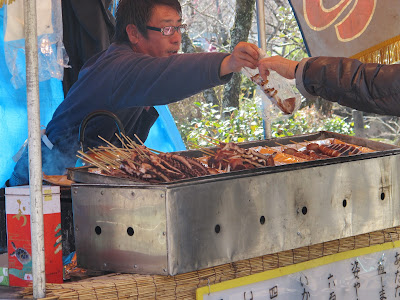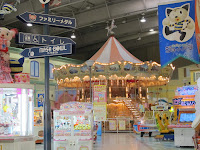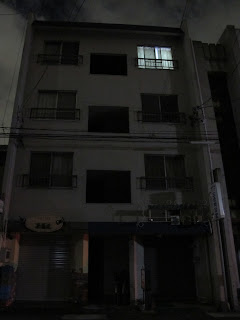Typically parks are simple places designed for the enjoyment of simple pleasures. They offer no more than a place to play and relax, and in doing so they are very generous. Other parks, such as amusement and water parks, try to offer more than simple pleasures. They claim to provide visitors with thrills and adventure. Though these are bold claims they are not completely unbelievable. Not nearly so unbelievable as the assertions made by a park I visited a few weeks ago.
It was an unbelievable park built upon a far fetched theory, claiming to be able to do something wholly improbable. The park is called The Site of Reversible Destiny. From above it looks like this: 

Closer up it looks like this:
It is a park, a piece of art and an architectural experiment based on the concept of reversing destiny. The concept of reversing destiny can be somewhat difficult to explain and even to harder to grasp, so instead of explaining it straight out I will explain how it unfolded to me.
I first heard of this place from Maggie who told me only the name and showed me a few photos. Both of us were very excited about the look of the place and the possibility that it would be conceptual art very much in line with our own thinking. Before going we spent some time discussing what Reversible Destiny might mean.
We began our discussion with the idea of destiny. Was destiny something that lay at the end of a predetermined path, or was it points along said path? Was it both? What do people mean when they say things like: it was my destiny to come to such and such a place? Does achieving one's destiny in this way mean that everything that comes afterwards is not destined? Are destiny and freewill mutually exclusive ideas? And if they are, how can one have the power, the freewill, to choose their destiny, let alone reverse it?
We began our discussion with the idea of destiny. Was destiny something that lay at the end of a predetermined path, or was it points along said path? Was it both? What do people mean when they say things like: it was my destiny to come to such and such a place? Does achieving one's destiny in this way mean that everything that comes afterwards is not destined? Are destiny and freewill mutually exclusive ideas? And if they are, how can one have the power, the freewill, to choose their destiny, let alone reverse it?
Considering the contradictory ideas presented I came to the conclusion that in this case destiny must be the decisions a person makes in life that leads them along a path to points that they have, for better or worse, expected to arrive at. The Site of Reversible Destiny must then be a place where one is given the opportunity to go back and change these decisions. It must be a place that exists in a metaphysical space outside of time and space. Or the site is arranged in such a way that visitors are transported to such a metaphysical state where the past, or their perception of the past, can be altered, thus reversing their destiny. It seemed like a pretty big claim for a park to make, and it made me want to go all the more.
Upon arriving at the park we paid our entrance fee, a nominal seven dollars. Then I saw this sign, and I began to doubt the rather bold claim I had made on the park's behalf.
I began thinking the site might be geared to broader ideas of destiny rather than those more personal. That instead of allowing each visitor to reverse their own personal destiny it was speaking to a destiny all humans share. Given the phrase at the center of the poster I assumed the destiny the park sought to reverse was the inevitable conforming to societal norms that people face as they get older. Simply the Site of Reversible Destiny was a place where adults were encouraged, and allowed, to return to a childlike state of mind. That this place was designed in such a way that it did not cater to expectation and as a result visitors would be forced to interact with the environment with a sense of newness and awe. An outlook found most prominently in the minds of children. This idea spoke to me, it agreed with my own philosophical views and having no other information to dismantel this idea I explored the park with this in mind. It was incredibly fun.
The park is very suitable for this kind of thinking. It is a huge, adult sized playground. The complex contains several buildings with floor plans designed like mazes. The interiors were painted with over a dozen colors with no semblance of order or purpose. Each building had several entrances and exits, which visitors are encouraged to use all of. Not one building had a level floor which gave me the sense that I was in a circus fun house or having a psychedelic experience. Adding to this feeling are the ceilings, which are not an exact mirror of the floor, but are designed in exactly the same, disorienting maze-like way.
The exterior portions of the park were much the same; no level surfaces, brightly and chaotically colored, with no sense of order to be found anywhere. Playing on this idea of disorder was a huge map painted over much of the park. This map was unlike most maps in that it was designed to disorientate. It was a map of several places; New York City, Berlin, Tokyo, Kuala Lampur, and each, I am pretty sure, less than accurate.
The outer rim of the park was large, narrow, ascending path that led to a dead end. The path was so narrow that when we encountered visitors headed the opposite direction, we had to cram our bodies up against the wall to let them pass. Physical contact was inevitable. It was also hilarious because people, and Japanese people in particular, have a tendency to let that sort of thing become very embarrassing.
The dead end was a crow's nest that overlooked the park, but was surrounded by such high walls that one could only struggle for the view provided. It seemed as if everything was designed as some kind of practical joke. As I was still in the mindset that the park was designed to make its visitors act like children, I thought this to be very clever.
The dead end was a crow's nest that overlooked the park, but was surrounded by such high walls that one could only struggle for the view provided. It seemed as if everything was designed as some kind of practical joke. As I was still in the mindset that the park was designed to make its visitors act like children, I thought this to be very clever.
The center of the park was a valley surrounded by this high cliff like rim and the aforementioned map. It was mostly grassy, but also had sections that were paved, and others that were covered in a rubber mesh mat that I have encountered beneath sinks in restaurant kitchens. These mats were clearly there to provide traction for the visitors, and were the only safety precaution evident in the entire park. The park as a whole was a struggling podiatrist's wet dream, or a frail ankled individual's nightmare.
As we explored the inner area of the park we came across a door way leading into the side of the surrounding hill.
No light shone from inside and I was immediately curious. We entered the door and, using the light from the outside world, were led down a corridor. The corridor extended far beyond the reach of natural light and we soon found ourselves immersed in total darkness. It was creepy, but we knew we were in a park so we assumed it was safe. The corridor got progressively narrower as we continued. Having no light to guide us, we used the walls. When the corridor came to an end we felt around the walls. We found that there was a very tight space that led further into the space. So we squeezed through it and found ourselves in yet another very dark and narrow corridor. We continued following these paths and turns until we ended up in a small room. It was a dead end. We stood in this space and let the details of our situation set in.
It was dark, we were underground, alone, and potentially very lost. Despite these details neither Maggie or myself felt very afraid. We were creeped out and possibly a little anxious, but it was more like climbing to the apex of a roller coaster than having fallen down a well. It was the kind of fear that instils laughter rather than panic, so we laughed until it seemed the excitement had passed. Then we easily found our way back to the out of doors. Once again in sunlight we explored the remainder of the park. We were satisfied, the cold was setting in, and the valley was growing darker. We decided it was time to go.
In the following days Maggie started doing more research into the park's history and creators. She had much to report, namely that my idea of what the park was all about was way off. I was right that the idea of destiny they were thinking about was a broadly applicable destiny. I was wrong, however, to think that this destiny was conforming to the norms of society.
No light shone from inside and I was immediately curious. We entered the door and, using the light from the outside world, were led down a corridor. The corridor extended far beyond the reach of natural light and we soon found ourselves immersed in total darkness. It was creepy, but we knew we were in a park so we assumed it was safe. The corridor got progressively narrower as we continued. Having no light to guide us, we used the walls. When the corridor came to an end we felt around the walls. We found that there was a very tight space that led further into the space. So we squeezed through it and found ourselves in yet another very dark and narrow corridor. We continued following these paths and turns until we ended up in a small room. It was a dead end. We stood in this space and let the details of our situation set in.
It was dark, we were underground, alone, and potentially very lost. Despite these details neither Maggie or myself felt very afraid. We were creeped out and possibly a little anxious, but it was more like climbing to the apex of a roller coaster than having fallen down a well. It was the kind of fear that instils laughter rather than panic, so we laughed until it seemed the excitement had passed. Then we easily found our way back to the out of doors. Once again in sunlight we explored the remainder of the park. We were satisfied, the cold was setting in, and the valley was growing darker. We decided it was time to go.
In the following days Maggie started doing more research into the park's history and creators. She had much to report, namely that my idea of what the park was all about was way off. I was right that the idea of destiny they were thinking about was a broadly applicable destiny. I was wrong, however, to think that this destiny was conforming to the norms of society.
The creators had no intention of creating a space where grown ups could regain some of their childhood spirit, nor should children maintain it. (At site of theirs in East Hampton children are prohibited and adults must sign a waiver.) The destiny they had in mind was death. What they had intended was to create a space that would literally keep people from dying, physically dying. I was more than baffled by this discovery. I was disheartened, and a little insulted at the audacity of such a claim.
The people behind The Site of Reversible Destiny are an artist couple who go by the names Arakawa and Gins. They have designed homes and parks around the world with the idea that specific architectural design, specifically non-functional design, can prevent death. Their idea is that by creating spaces that 'cradle tentativeness' they can fend of mortality. The point of 'cradling tentativeness' is so that the occupant will never be able to settle or get comfortable, ideas this couple associates with aging and dying.
Though the Site of Reversible Destiny was wholly enjoyable the idea that death can, and should, be prevented is totally absurd and disparagingly arrogant.
Little to my surprise it was not just this couple's ideas that were steeped in arrogance, but also what they had to say for, and about, themselves. Here are a few quotes from an article in the New York Times that illustrate their baffling sense of self-importance.
“After this, Gehry, Rem Koolhaas — boring,” Ms. Gins said.
Though the Site of Reversible Destiny was wholly enjoyable the idea that death can, and should, be prevented is totally absurd and disparagingly arrogant.
Little to my surprise it was not just this couple's ideas that were steeped in arrogance, but also what they had to say for, and about, themselves. Here are a few quotes from an article in the New York Times that illustrate their baffling sense of self-importance.
 |
| The interior of a house designed by Arakawa and Gins. |
“After this, Gehry, Rem Koolhaas — boring,” Ms. Gins said.
“We should win a Nobel Prize for this,” Arakawa said. Asked if her husband was serious, Ms. Gins replied, “Of course he is.”
“It’s immoral that people have to die,” Ms. Gins explained.
“They ought to build hospitals like this,” she said.
“If Neil Armstrong were here, he would say, ‘This is even better!’ ”
Furthering the absurdity of their claim is the fact that Arakawa died in 2010, he was 73. Gins refused to tell the press the cause of Arakawa's death. Her only comment was, 'this mortality thing is bad news'.
Death, in my opinion, is like rain. It makes our mood somber, it keeps us from playing outside, and it makes us want to sleep the day through. It is a natural process that often gets in the way of what we might otherwise have planned, but it also allows for growth, cleansing, and renewed outlook. It is not something that can be planned for nor can it be avoided. I think it is said best in the Hagakure, 'There is something to be learned from a rainstorm. When meeting with a sudden shower you try not to get wet and run quickly along the road. By doing such things as passing under the eaves of houses you still get wet. When you are resolved from the beginning you will not be perplexed, though you will still get the same soaking. This understanding extends to all.'


















































